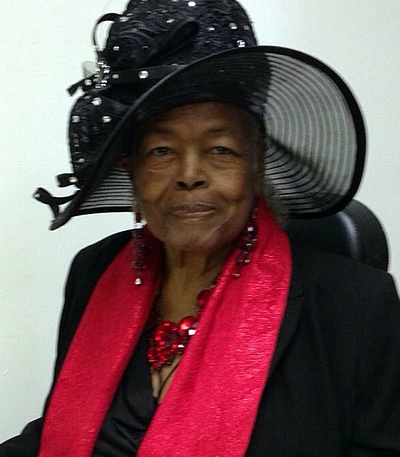Friday, Sept. 16, 2016 | 2 a.m.
Perplexed Caesars Palace gamblers grabbed their money from the tables and scurried from the casino floor on March 6, 1971, as dozens of low-income mothers and their children zipped through, chanting, singing and clapping — closing the location for about an hour.
Mary Wesley was on the frontline of the demonstration that day, accompanied by the likes of Jane Fonda and Sammy Davis Jr., said Wesley's granddaughter, Shalonda Adams.
Wesley, who on her own raised eight children and 17 grandchildren, died on Tuesday, Adams said.
She was 79.
Activism
The 1971 protest is detailed in Annelise Orleck's book, "Caesars Palace: How Black Mothers Fought Their Own War on Poverty."
The marchers demanded improvements to Nevada welfare programs, which faced a consistent threat of defunding at the time.
In the late '60s, Wesley had been a single mother of eight who worked two jobs: one check paid rent and the other a babysitter, she told Orleck.
Similar circumstances beset fellow Las Vegans Ruby Duncan, Alversa Beals and Rosie Seals, who, after learning about welfare programs in other states, joined with Wesley to found the Operation Life movement and became known the "Westside mothers."
In a brief stint in California, Wesley learned firsthand how beneficial that state's welfare aid was. When she moved back to Las Vegas, she wondered, “Why doesn’t Nevada have (such benefits)?” Adams said.
Activism wasn't something the women set out to do, Adams said. “It was (that their) children were starving and there weren't any programs here to help us."
“It was more of a need that took on a snowball effect,” Adams said. Instead of improving on the aid already in place, Nevada was trying to cut it.
"The state was the last in the nation to implement the food-stamp program and one of the last to set up nutritional programs and free medical screening for children," Orleck told the Associated Press in 2005. "Like many states during the early 1970s, the height of the 'war on welfare,' Nevada cut aid to the poor."
Significant reform bloomed from the movement's efforts, which grew to include hundreds of women, Adams said.
A food stamp program was implemented after the group lobbied state legislators, Orleck said.
The group organized the 1971 protest that shut down Caesars Palace — many similar marches followed — and fought Nevada in federal court when the state tried to cut its welfare caseload by about a third, Orleck said. They were also responsible for building the first West Las Vegas library and a clinic for women and children.
Upbringing
Wesley was born in Quitman, Miss., in 1937. She left her hometown and high school for Las Vegas when she was 16. Her mother, who stayed behind, had allowed her to move with her sister to make a living.
In her later years, Wesley lamented not earning her high school diploma, which she was shy of getting before the move, Adams said.
Once in Las Vegas, Wesley settled in the historic West Las Vegas, married and had eight children — among them two sets of twins.
After a divorce, she raised her children. To support herself and the kids, she picked up two jobs, she told Orleck. “I was working day shift as a maid in the Showboat and night shift as a cocktail waitress on the Westside."
"And I was paying one check to the baby-sitter and the other for rent. I just couldn't do it," she said in the book.
That’s what pushed her into activism, Adams said.
Her parents became her main drivers and inspiration, she said.
Her mother had allowed her independence and Wesley's father, who died on Christmas Eve when she was 3, lived through the stories her mother would tell the kids.
And it was through through those tales that she learned so much, Adams said. Respect and character were ingrained from something her father would tell the family: “Never to say sir or ma’am to a white person just because of their color, but out of respect and not out of fear.”
That character made Wesley a selfless matriarch to her family, Adams said. To keep the grandchildren together when her sons and daughters moved on to other ventures, she took on raising 17 of her grandchildren.
“She was the pillar, that cornerstone for us,” Adams said. And every single one of her family feels like they were her favorite relative based on how equally loving she was to everyone.
Wesley’s major dream was to open a restaurant. She had been cooking since she was a young girl and that dream came to fruition briefly in the 1980s when she opened a soul-food restaurant, “Mary’s Diner,” on Jackson Street. She gave it up to raise the grandkids after she took custody of the 14th.
As far as their upbringing, education was always key.
Adams said she was the first person in her family to graduate college, earning a master’s in business communication, because of her grandmother's motivation. She jumped into a career helping people become foster parents with the Clark County Department of Family Services, where she tells stories about Mary Wesley four times a month as a way to “pay it forward.”
Life has come full circle, Adams said.
Wesley's viewing will be held at 9 a.m. Sept. 24 at Greater Evergreen Missionary Baptist Church, 1915 Lexington St. Services will follow at 11 a.m. Space is limited.
The Associated Press contributed to this report.


Join the Discussion:
Check this out for a full explanation of our conversion to the LiveFyre commenting system and instructions on how to sign up for an account.
Full comments policy